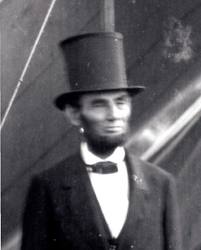Little Life Lessons from Lincoln
On July 4, 1863, Robert E. Lee was leading a Confederate army in retreat from Gettysburg when they were trapped against the rain-swollen Potomac River. The Union army, commanded by General George Meade, pursued the rebels. Abraham Lincoln ordered Meade to attack immediately. Instead, Meade dithered, the weather cleared, the river shrank, and Lee and his army escaped. Lincoln was furious and penned this letter to Meade:
I do not believe you appreciate the magnitude of the misfortune involved in Lee’s escape. He was within our easy grasp, and to have closed upon him would, in connection with our other late successes, have ended the war. As it is, the war will be prolonged indefinitely. If you could not safely attack Lee last Monday, how can you possibly do so south of the river, when you can take with you very few— no more than two-thirds of the force you then had in hand? It would be unreasonable to expect and I do not expect that you can now effect much. Your golden opportunity is gone, and I am distressed immeasurably because of it.
Interestingly, Lincoln never sent the letter — it was found among his papers after his death. Lincoln generally praised his colleagues for their positive accomplishments and said little or nothing about their failures. Apparently, he wrote letters like the one to Meade to relieve his own frustrations — and perhaps to leave a record for history — rather than to humiliate his colleagues and create public acrimony.
As Douglas Wilson, a Lincoln scholar, pointed out in a recent article (click here), Lincoln was great communicator but not necessarily in the way we think. Some tidbits on how he worked:
- He rarely spoke in public and when he did he was very well prepared. We think of the Gettysburg Address and the Second Inaugural speech as great feats of oratory — and they were. But there weren’t many such feats; he gave relatively few speeches. And he almost never spoke off the cuff. He knew that people followed his words closely and he prepared meticulously. His speeches were extraordinary. Equally extraordinary is the fact that he almost never said anything stupid that he had to retract. Our politicians and executives today could learn a lot from him.
- He pre-wrote his speeches. Lincoln always had scraps of paper with him — which he often stored in his hat. When an idea — or an elegant way to phrase an idea — came to him, he jotted it down. He didn’t start thinking about his speeches when a deadline drew near. He was thinking about them virtually all the time.
- He was mercifully brief. The Gettysburg Address consisted of 267 words. By contrast, this post has about 600. Which one do you think will live longer?
- He cultivated the press before he needed them. In general, Lincoln got to know his audience before he spoke to them. He gave favors to journalists before he asked for favors in return. Getting to know your audience and letting them know that you genuinely care about them are always good strategies.
- He understood event jujitsu. The Civil War began with the crisis at Fort Sumter in Charleston harbor. Lincoln could have sent in a fleet to shoot up the Confederate fortifications. Instead, he sent in a small re-supply mission. When the Confederates sought to block the mission, they fired the first shots of the war. It’s a small leap to conclude that the Confederates “started” the war. Thus, a small incident became a major victory in the battle to shape perceptions.
Lincoln has always been one of my favorite presidents and I certainly enjoyed the recent movie from Steven Spielberg. Lincoln communicated effectively and was an expert at shaping public opinion. As the movie showed, he was also adept at cutting deals and rolling logs to achieve his greater goals. Not bad for a kid from the prairies.
